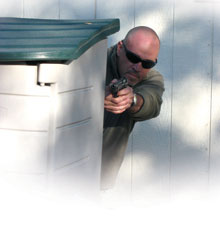Guess what: Someone has broken into your house, and he’s in the next room. You have your firearm drawn and ready to defend yourself and your family or maybe it’s just you and your fish (I have a Beta fish named Sushi). If you are required to shoot an intruder you should think about some things.
TIP 1: Be mentally prepared. Practice awareness of your surroundings under pressure. Certainly decide if you could respond to an intruder with lethal force. Being in a life and death situation and suddenly realizing that you cannot respond is not a situation that anyone wants to be in. Know the law and abide by it.
TIP 2: Develop your shooting skills. Know how to handle your gun, practice different shooting positions (safely) and practice, practice, practice.
TIP 3: Light helps dim fear. Keep a flashlight near you if you do not have one attached to your firearm. Practice holding both at the same time. Don’t be afraid of flipping the light switch to the on position. I know, right? Who would have thought sweeping a room with the lights on makes it easier. You would be surprised.
TIP 4: Keep your keys close to your bed. If you think someone is in your house, or even outside trying to get in, you would be surprised by how effective a car alarm can be as a deterrant. Also, should you escape, you will want to be prepared to get away from the intruder.
TIP 5: Plan, plan, plan. Know where your family is, have a code word or plan, one that is simple for everyone at any age to follow, one that once barked out there is not a lot of stone faces looking back at you asking questions. Know safe bullet trajectories and make sure you practice positions that do not fire into your loved ones’ rooms.
TIP 6: Pets. I know my fish is not going to do much against a group of armed assailants, heck it does not do much against the food I put in its bowl, but dogs, even the smallest, will bark, and this gives you an advantage. An early warning system that will lick your face and its own butt. Ahhh puppy love.
TIP 7: Cover and concealment. Knowing the difference is very important. Concealment hides you but would not stop a bullet, cover on the other hand is a surface that will stop a bullet. Don’t forget that bullets can easily penetrate drywall. This is important to remember defensively and offensively. While your couch can hold you and 10 of your friends up while you jump around and cheer on your favorite football team, stuffing is a poor deterrent for a bullet. Go to your safe area.
TIP 8: If you are with someone (and not a lonely shut-in), don’t lock them in the “safe area” and go wandering looking for trouble. You only expose yourself and them to danger. Call the police. Barricade behind cover or concealment and call 911. Don’t put yourself, your family or your fish in harm’s way. If you are locked up and are safe in the designated safe area, and they can not, or are not going to get you, stay put.
TIP 9: Prepare your home. Makes sure you have whatever combination of lights, locks and landscaping make your home as safe as possible.
In the end, if you are in a situation where you are required to use your firearm to protect yourself and your loved ones and you are required to talk to the police, listen to this advice if nothing else. Don’t say anything without a lawyer. I am not advocating not talking to the police, I have the utmost respect for those who are willing to lay their life down to protect mine. Unless you are a soldier of fortune or a gun for hire, pulling the trigger on another human being can be very traumatic. You need time to absorb what has happened. For example if you tell police you fired two shots, and they look to see you fired everything you had plus reloaded twice, they may look at you a little differently. Again under stressful situations things move and happen at a different pace.
None of this should be considered legal counsel. If you have questions about self defense you should consult an attorney familiar with your local laws and regulations. For further questions regarding these tips, please seek an NRA certified counselor or take a Personal Protection in the Home class.

